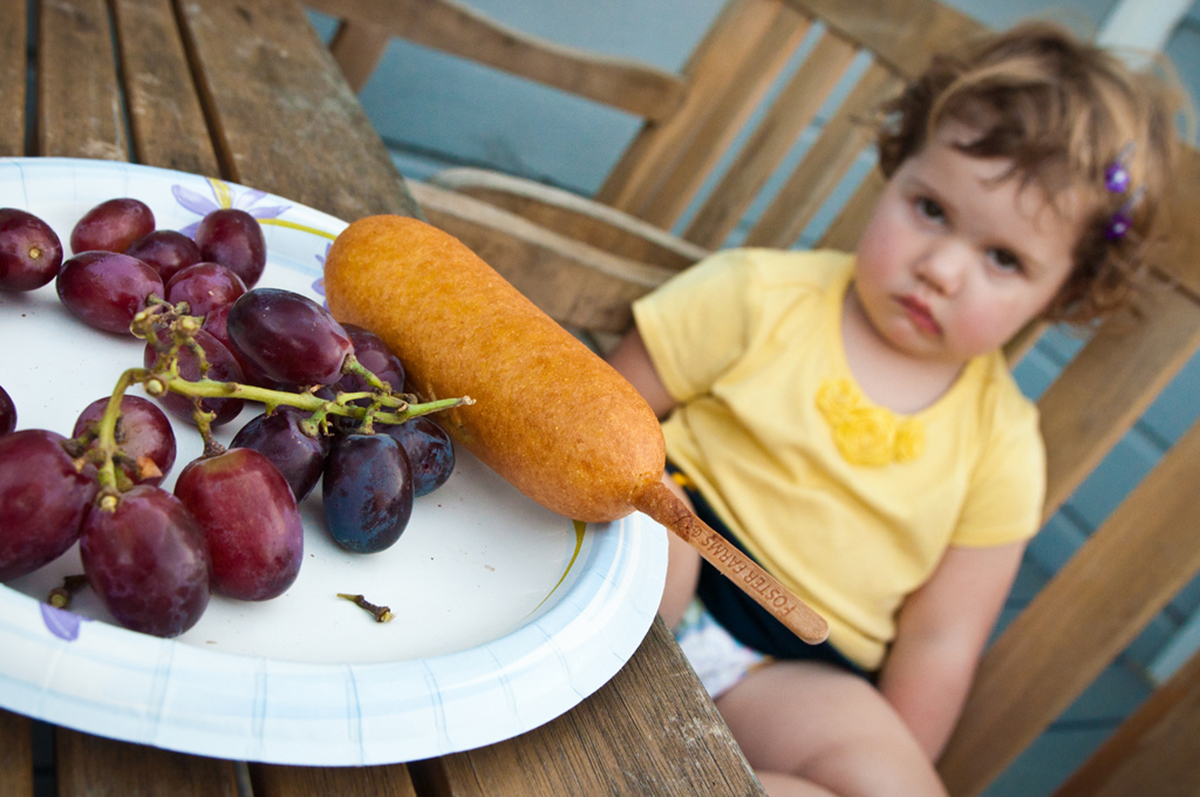Every parent knows the scene. It's dinner time. Mummy sits opposite Betsy, the tot's fist screwed tightly around the fork, an uneaten plate of food in front of her. "Just one forkful of mashed potato." Mummy pleads.
Betsy shakes her head back and forth, "No!"
"But you like mashed potato." Mummy says.
"I don't!" the thirty-month old replies, "I hate it. I never want it; not never again."

And so it goes on. Finally, Mummy promises that, if Betsy will have one forkful, she can have ice-cream with sprinkles for dessert. Looking as though you asked her to eat polonium, Betsy purses her lips and pushes three millimetres of mashed potato between. Dropping her fork, she turns to Mummy with a smile: "Now, I get to have ice-cream." she says.
If this sounds familiar, let's explore why toddlers suddenly become so picky, and how you can sidestep those power-struggles and mealtime-wars to help your child have a better relationship with food for years to come.
Why Is My Child Suddenly So Picky?
- Your child may be sick: If your child is only just being picky, it's possible s/he may feel under the weather. Few people want to eat, even their favourite foods, when they feel sick. If your child is teething, or otherwise poorly, you can expect sudden bouts of fussiness, including the rejection of usual favourites.
- Toddlers enjoy getting a reaction from their parents: Do you know what's a lot of fun when you're two years old and can't do much? Frustrating your parents by not-eating.
- Toddlers enjoy asserting their independence: A two-year-old has discovered the word "no", and they like it. Much like wanting to get a reaction from their parents, they want to show their parents that they're not a little baby who can be spoonfed blended carrots anymore.
- Toddlers are finicky: Toddlers are very fickle. Today their favourite programme is "Charlie and Lola", tomorrow they love "In the Night Garden". Today, they love mashed potato, tomorrow it's icky and slimy and they never liked it - not ever!
- Neophobia: This is a fear of new things - healthy from an evolutionary standpoint - that may be harmful or dangerous. We know spinach is a good, healthy vegetable. But it can taste a bit bitter and looks a bit funny and a toddler may not want to eat it for those reasons. Neophoboia may also present as not wanting to eat his biscuit if it's broken because it "doesn't look the same", or not wanting to use a different dish. While it can be frustrating, remember this same instinct prevents your toddler eating used chewing gum or rocks that s/he finds on the ground.
- Appearances can be deceiving: During the first year of life, children triple their body weight. After that time, growth slows, and appetite shrinks. Then it can appear that children aren't eating enough to live on. Presented with food on a regular basis, a child will not starve; even if it appears they're picking at their food. For reassurance, take your child to your doctor to have their height and weight measured to check your child is healthy.
READ How To Get Your Toddler To Stop Hugging Everyone
If your child is being picky, for whatever reason, why not turn to the next page and see how you can encourage your toddler to eat.
How Can I Encourage My Child to Eat?
Don't engage in power-struggles
Do not force your child to have a snack or meal if they are not hungry. Do not push your child to clear their plate at dinnertime, either by threats or jovial bribery. Do not do not try to force your child to eat food they do not like. Doing this will place you and your child on opposite sides, and make mealtimes a time of stress for both you and your child. It might be frustrating when you take the time to cook a meal, only for your child to leave it, but you must let your child learn to judge their hunger.
Nonchalantly clear the food from your child's plate and give smaller portions in future. But, if your child asks for more, always provide it.

Give a small portion of new food alongside old favourites
Never attempt to give a meal comprised entirely of new offerings. Due to Neophobia, most children will reject the whole thing. Instead, offer one new food with firm favourites. For example, if your child loves macaroni cheese, add a couple of cherry tomatoes or slices of red peppers. Alternatively, try adding some new fruit to a favourite breakfast cereal.
Offer a tray of healthy snacks
Providing healthy snacks prevents a drop in blood sugar, which may lead to tantrums. So leave a tray of healthy snacks in a prominent place and let your toddler snack on them throughout the day. Apple segments; oat crackers; wedges of hard-boiled eggs; pitta bread segments, carrots and celery with cottage cheese or hummus (kids love the messy fun of dipping things); squares of cheese; and banana slices all make healthy, tasty snacks that keep your child's energy levels up.
Conceal Vegetables
A lot of toddlers, and even some older kids, think they hate vegetables. If you have a "veggie-phobic", try the following methods to sneak more vegetables into your toddler's diet (until they're old enough to try them more openly):
- Blend vegetables into bolognaise sauces
- Dice vegetables and add them to a cheese sauce (most toddlers will eat anything smothered in a cheese sauce)
- Blend vegetables to add to the puree of a pizza
Make Food Fun
Try using exciting names for food. "Green beans" are boring, but "Super Beans" are fun and exciting. Broccoli is dull, but what kid wouldn't love "Dinosaur trees"? Research published by the British Psychological Society show fun-names encourage young children to eat their vegetables.
Alternatively, try a Teddy Bear Picnic. Get out your child's toys and lay out a selection of finger foods (sandwiches, vegetables and dip). This is a fun activity, and may encourage your child to try food that they would normally avoid.
Set a Good Example
Children follow the behaviours they observe. So, if you want your child to eat healthily, ditch the potato chips and fatty French fries and load up your plate with healthy greens and lean chicken. Make sure your child sees you enjoying a healthy and balanced diet by eating at the table with them.
Let your child choose
Your child is more likely to eat a vegetable they've picked. So take them to the supermarket, and ask them to pick a vegetable they want for dinner. Let them hold the vegetables, and feel a sense of ownership. Get them to help you prepare it (wash it), and help you set the table. It may be messy, but it will make your child feel independent, in control and responsible. Choosing their own vegetable to try will make them more likely to try it.
Do not use dessert as a reward or punishment
Rewarding good behaviour with dessert, or punishing bad behaviour by withholding dessert, will only encourage unhealthy eating later in life by increasing your child's craving for sweet treats. Dessert should be offered regardless of behaviour and regardless of whether or not your child ate their main course. However, most of the time, you should offer healthy desserts such as yoghurt or fresh fruit.
Don't encourage fussy-eating
Parents often encourage fussy-eating. They encourage it by preparing a second meal for the child who has rejected the meal they first prepared. This just encourages the child to be picky. Barely picking at one meal will not damage your child, and - if they stay at the table, watching their family eat the meal they rejected - they may be tempted to eat a little more.
READ Picky Eater, Here Is Your List Of Healthy Foods
If pickiness continues, see a doctor
Although most parents find fussy-eating is a phase that their toddlers grow out of, if you are concerned about your child's growth or development - or if your toddler is becoming increasingly selective with food - you should consult a doctor.
Most children grow out of the fussy-eating phase by the age of four-years-old. Although the steps outlined won't improve your child's eating habits overnight, consistent steps and love will prevent it from becoming a long-term problem. By making a few small efforts now, you can help your child develop healthy eating habits for decades into the future.
- http://www.askdrsears.com/topics/feeding-eating/feeding-infants-toddlers/picky-eater http://www.babycentre.co.uk/x552305/why-is-my-toddler-such-a-fussy-eater http://www.bps.org.uk/news/funny-food-names-help-kids-eat-healthy http://www.webmd.com/parenting/guide/solutions-for-toddler-eating-problems
- Photo courtesy of carbonnyc: www.flickr.com/photos/carbonnyc/6144729060/
- Photo courtesy of carbonnyc: www.flickr.com/photos/carbonnyc/6144729060/
- Photo courtesy of donnieray: www.flickr.com/photos/donnieray/14581168505/

